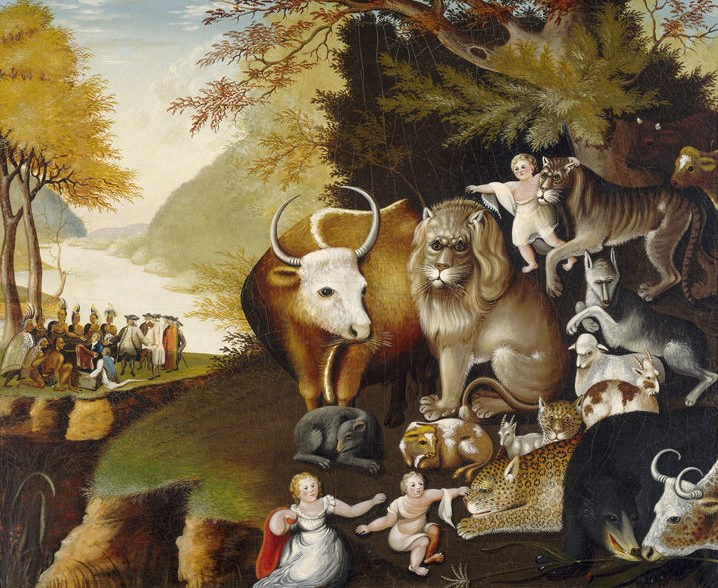
Edward Hicks was a folk painter in early 19th century America. A devout Quaker, he was profoundly taken with the hope for peace offered by the prophet Isaiah, whose dramatic vision for a renewed world claimed: “The wolf shall also dwell with the lamb, and the leopard shall lie down with the kid; and the calf and the young lion and the fatling together; and a little child shall lead them.” (Isaiah 11:6) Hicks developed Isaiah’s vision in over 100 paintings through the course of his lifetime, all of which he entitled, “Peaceable Kingdom.”
We thought of Hicks’ devotion to the idea of a peaceable kingdom recently when the scripture texts assigned for our reading included his favorite: the Isaiah prophecy of peace. Of course, we seem far, far away from peace on earth. And yet there are hints that what we think impossible might yet occur.
In her book of essays entitled “Small Wonder,” Barbara Kingsolver tells of a surprising story reported by Reuters News Service in 2001. According to the story, a wife and husband, nomads of the Lori tribe in Iran, had just walked home from their day’s work in the fields, when they discovered that their 16-month-old son was missing. They looked in his usual hiding places, under a pillow and behind boxes, but he was nowhere to be found. They shouted for their neighbors, who turned out to help in a frantic search of the area. But it quickly began to grow dark and cold, and still the child was missing.
The child’s father then announced that he and the other men would search more widely. They headed into the surrounding rocky hills and caves to look for the boy. The attempt seemed futile, if not foolish. How could a child, only 16 months old, have gone that far? But desperation fueled their willingness to persevere, and the search party set off.
They cast glances behind every boulder, hoping to find the child. And at each cave opening, they peered in. The group proceeded quietly on their thorough search, but as the night progressed, hopes waned. Night turned to day, and day to night, and three days passed. Finally, when hope was all but gone, they heard a noise at the mouth of a cave. Cautiously they looked into the darkness, the air scented with a fragrance they linked only with bears. But the noise they heard was from the boy. He was in there crying, alive. So the group carefully moved into the cave and spotted the dark, round shape of a thick-furred, she-bear. Amazingly, the bear was not threatening either the searchers or the child. In fact, she was curled protectively around the little boy. Newspapers reported that the bear had apparently fed the child and kept him warm, protecting him until the rescuers brought him safely home.
The story leads us to believe that Isaiah’s vision may not be as far-fetched as it seems. If such a seeming anomaly is possible, if predators can become protectors, then maybe there is hope of a peaceable kingdom on earth, after all. And perhaps if we were all as devoted to envisioning it as the painter Hicks was, we could speed its arrival. If we can’t paint it, let’s speak about it, sing about it, pray for it.



